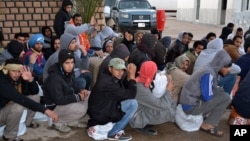Qatar's neighboring Gulf monarchies are backing the emirate in its dispute with Cairo over Egypt's military intervention in Libya. Analysts say this suggests the Sunni monarchies are now offsetting their own rivalries and trying to speak on foreign policy with a more unified voice, as threats in the region multiply against them - from the emergence of the jihadist Islamic State to the growing clout of Iran.
The oil-rich Sunni monarchies of Saudi Arabia, the United Arab Emirates and Kuwait have been bankrolling Egypt’s military-backed government since the 2013 ouster of President Mohamed Morsi of the Muslim Brotherhood. Until this week they had disapproved of Qatar’s criticism of the toppling of Morsi, and bridled at the emirate’s support of political Islamists.
But as the diplomatic spat between Cairo and Doha heated up this week over Egypt’s airstrikes in Libya, the regional Gulf Cooperation Council has come to Qatar’s defense. The GCC, which is dominated by Saudi Arabia, is likely to cut back on financial assistance to Egypt, Gulf diplomats say.
Since the overthrow of the Morsi government in July 2013, the Gulf states have given nearly $11 billion - credited to Egypt in non-interest-bearing accounts - to help support Cairo's foreign-exchange reserves and discounts on oil.
Egypt’s intervention in Libya followed the mass execution last weekend of 21 Egyptian Coptic Christians by Libyan militants affiliated with the so-called Islamic State. Since then Doha and Cairo have exchanged acrimonious charges, and Qatar has recalled its ambassador to Egypt. Egyptian officials accuse Qatar of supporting terrorism - an allegation vehemently denied by Doha. Qatari officials say Cairo should have consulted broadly before launching retaliatory raids.
Egypt 'defies truth'
Late Wednesday, Abdul Latif al-Zayani, secretary-general of the GCC, warned Egypt that it "defies the truth" in its accusations against Qatar, which has been sponsoring one of two rival governments in Libya.
“These accusations do not help to consolidate Arab solidarity at a time when our Arab countries are subjected to major challenges to their security, stability and sovereignty,” he said. However, the GCC tempered its criticism of Cairo by issuing a second statement praising Egypt’s homeland-security measures.
Saudi Arabia has long disapproved of Qatar’s independent-mindedness and its backing of the Muslim Brotherhood across the Middle East. The UAE, Bahrain and Saudi Arabia all withdrew their ambassadors from Qatar last year.
But in recent weeks, following the death of Saudi’s King Abdullah and the succession of Salman bin Abdulaziz al-Saud, there have been increasing signs of rapprochement between Riyadh and Doha. Saudi Arabia's ambassador to Qatar returned to his post in Doha in November, ending a seven-month break in diplomatic relations.
Qatar has also had a recent change of leadership. Sheik Hamad bin Khalifa al-Thani abdicated a year ago, handing off power to his 33-year-old son to rule the tiny but super-wealthy emirate. The new monarch has expelled from Qatar several political exiles affiliated with the Muslim Brotherhood.
In December, the Saudis tried to improve relations between Doha and Cairo by arranging a meeting between Egyptian President Abdel Fattah al-Sisi and a top Qatari envoy - the firwst high-level encounter since the Egyptian leader took office last summer.
Despite being spun publicly as successful, the meeting didn’t diminish Cairo’s frustration with Doha, which it accuses of encouraging Islamist opposition to President Sisi via the Qatari-owned Al-Jazeera television channel and other media outlets controlled by the emirate’s royal family.
Iran power play in Yemen
The decision to side with Qatar in its diplomatic clash with Cairo is a reflection of the Gulf leaders' rising alarm about expanding Iranian power - the latest sign of that coming with the overthrow of the Sunni-dominated government in Yemen, Saudi’s neighbor. Analysts say the Shia rebels in that takeover were heavily supported by Tehran.
David Weinberg with the the Foundation for the Defense of Democracies, a U.S.-based think tank, says the convergence between the Saudis and the Qataris should be seen in the “context of the disaster in Yemen, which the GCC states also attribute to direction by Iran.” He adds: “ The Saudis are also deeply concerned about having the Islamic State on their northern border. Further, reports continue to suggest that Saudi Arabia's new king, Salman bin Abdulaziz, is less interested in destroying Qatar's ally, the Muslim Brotherhood, than the late King Abdullah [was]."
Gulf political analyst Mubarak Fahad al Duwailah says, “Developments in Yemen are another indication of what the Iranians are capable of. Whoever thinks that it is a struggle between Yemenis is not familiar with the larger picture.” With Shia Iran gaining a foothold in the Arabian Peninsula, he arguers that the GCC has had to “reconsider internal and external policies.”
The reconsideration appears to include ensuring that the Sunni monarchies cohere more - and make that a priority higher than their relations with Cairo.
Since Iraq came more into Iran’s orbit following the U.S.-led ouster of Iraqi strongman Saddam Hussein, Saudi Arabia and the other Gulf monarchies have been increasingly alarmed at the risk of Iranian power. Baghdad's reliance on Shia militias now to fight Islamic State militants, and the dependence of Syria's Assad regime on Tehran, has fueled the fears of the Sunni monarchies.
Even before the civil war in Syria, according to widely leaked diplomatic cables, the Saudis were raising their fears about Tehran with U.S. officials. In one cable describing a meeting between the current Crown Prince Muqrin bin Abdulaziz and then-U.S. homeland security adviser John Brennan, the Saudis warned that the “Shia crescent has become a full moon.”
“Getting closer with Qatar naturally could involve some costs for Saudi Arabia in its relations with Egypt,” says analyst Weinberg. “The Saudis are trying to have it both ways, but Qatar and Egypt will no doubt push Riyadh to lean one way or the other.”




